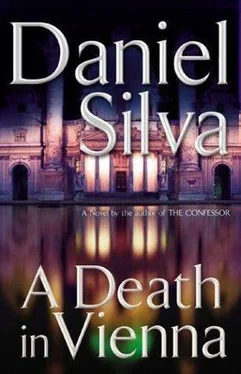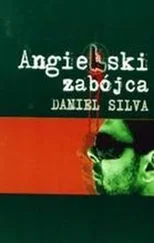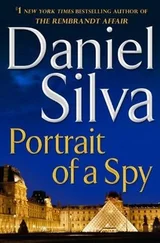“It’s a lovely story,” Gabriel said, helping Tziona tuck the ends of a sheet beneath the couch cushions. “But what does it have to do with my mother?”
“The midrash teaches us that until the sparks of God’s light are gathered together, the task of creation will not be complete. As Jews, this is our solemn duty. We call it Tikkun Olam: Repair of the World.”
“I can restore many things, Tziona, but I’m afraid the world is too broad a canvas, with far too much damage.”
“So start small.”
“How?”
“Gather your mother’s sparks, Gabriel. And punish the man who broke her vessel.”
THE FOLLOWING MORNING, Gabriel slipped out of Tziona’s apartment without waking her and crept down the cobblestone steps in the shadowless gray light of dawn with the portrait of Radek beneath his arm. An Orthodox Jew, on his way to morning prayer, thought him a madman and shook his fist in anger. Gabriel loaded the painting into the trunk of the car and headed out of Safed. A bloodred sunrise broke over the ridge. Below, on the valley floor, the Sea of Galilee turned to fire.
He stopped in Afula for breakfast and left a message on Moshe Rivlin’s voice mail, warning him that he was coming back to Yad Vashem. It was late morning by the time he arrived. Rivlin was waiting for him. Gabriel showed him the canvas.
“Who painted it?”
“My mother.”
“What was her name?”
“Irene Allon, but her German name was Frankel.”
“Where was she?”
“The women’s camp at Birkenau, from January 1943 until the end.”
“The death march?”
Gabriel nodded. Rivlin seized Gabriel by the arm and said, “Come with me.”
RIVLIN PLACED GABRIEL at a table in the main reading room of the archives and sat down before a computer terminal. He entered the words “Irene Allon” into the database and drummed his stubby fingers impatiently on the keyboard while waiting for a response. A few seconds later, he scribbled five numbers onto a piece of scratch paper and without a word to Gabriel disappeared through a doorway leading to the storerooms of the archives. Twenty minutes later, he returned and placed a document on the table. Behind a clear plastic cover were the words YAD VASHEM ARCHIVES in both Hebrew and English, along with a file number: 03/812. Gabriel carefully lifted the plastic cover and turned to the first page. The heading made him feel suddenly cold: THE TESTIMONY OF IRENE ALLON, DELIVERED MARCH 19, 1957. Rivlin placed a hand on his shoulder and slipped out of the room. Gabriel hesitated a moment, then looked down and began to read.
16 THE TESTIMONY OF IRENE ALLON:
MARCH 19, 1957
I will not tell all the things I saw. I cannot. I owe this much to the dead. I will not tell you all the unspeakable cruelty we endured at the hands of the so-called master race, nor will I tell you the things that some of us did in order to survive just one more day. Only those who lived through it will ever understand what it was truly like, and I will not humiliate the dead one last time. I will only tell you the things that I did, and the things that were done to me. I spent two years in Auschwitz-Birkenau, two years to the very day, almost precisely two years to the hour. My name is Irene Allon. I used to be called Irene Frankel. This is what I witnessed in January 1945, on the death march from Birkenau.
To understand the misery of the death march, you must first know something of what came before. You’ve heard the story from others. Mine is not so different. Like all the others, we came by train. Ours set out from Berlin in the middle of the night. They told us we were going to the east, to work. We believed them. They told us it would be a proper carriage with seats. They assured us we would be given food and water. We believed them. My father, the painter Viktor Frankel, had packed a sketchpad and some pencils. He had been fired from his teaching position and his work had been declared “degenerate” by the Nazis. Most of his paintings had been seized and burned. He hoped the Nazis would allow him to resume his work in the east.
Of course, it was not a proper carriage with seats, and there was no food or water. I do not remember precisely how long the journey lasted. I lost count of how many times the sun rose and set, how many times we traveled in and out of the darkness. There was no toilet, only one bucket-one bucket for sixty of us. You can imagine the conditions we endured. You can imagine the unbearable smell. You can imagine the things some of us resorted to when our thirst pushed us over the edge of insanity. On the second day, an old woman standing next to me died. I closed her eyes and prayed for her. I watched my mother, Hannah Frankel, and waited for her to die, too. Nearly half our car was dead by the time the train finally screeched to a stop. Some prayed. Some actually thanked God the journey was finally over.
For ten years we had lived under Hitler’s thumb. We had suffered the Nuremberg Laws. We had lived the nightmare of Kristallnacht. We had watched our synagogues burn. Even so, I was not prepared for the sight that greeted me when the bolts slid back and the doors were finally thrown open. I saw a towering, tapered redbrick chimney, belching thick smoke. Below the chimney was a building, aglow with a raging, leaping flame. There was a terrible smell on the air. We could not identify it. It lingers in my nostrils to this day. There was a sign over the rail platform. Auschwitz. I knew then that I had arrived in hell.
“Juden, raus, raus!”An SS man cracks a whip across my thigh. “Get out of the car, Juden. ” I jump onto the snow-covered platform. My legs, weak from many days of standing, buckle beneath me. The SS man cracks his whip again, this time across my shoulders. The pain is like nothing I have ever felt before. I get to my feet. Somehow, I manage not to cry out. I try to help my mother down from the car. The SS man pushes me away. My father jumps onto the platform and collapses. My mother too. Like me, they are whipped to their feet.
Men in striped pajamas clamber onto the train and start tossing out our luggage. I think, Who are these crazy people trying to steal the meager possessions they had permitted us to bring? They look like men from an insane asylum, shaved heads, sunken faces, rotten teeth. My father turns to an SS officer and says, “Look there, those people are taking our things. Stop them!” The SS officer calmly replies that our luggage is not being stolen, just removed for sorting. It would be sent along, once we’d been assigned housing. My father thanks the SS man.
With clubs and whips they separate us, men from women, and instruct us to form neat rows of five. I did not know it then, but I will spend much of the next two years standing or marching in neat rows of five. I am able to maneuver myself next to my mother. I try to hold her hand. An SS man brings his club down on my arm, severing my grasp. I hear music. Somewhere, a chamber orchestra is playing Schubert.
At the head of the line is a table and a few SS officers. One in particular stands out. He has black hair and skin the color of alabaster. He wears a pleasant smile on his handsome face. His uniform is neatly pressed, his riding boots shine in the bright lights of the rail platform. Kid gloves cover his hands, spotless and white. He is whistling “The Blue Danube Waltz.” To this day, I cannot bear to hear it. Later, I will learn his name. His name is Mengele, the chief doctor of Auschwitz. It is Mengele who decides who is capable of work and who will go immediately to the gas. Right and left, life and death.
My father steps forward. Mengele, whistling, glances at him, then says pleasantly, “To the left, please.”
“I was assured I would be going to a family camp,” my father says. “Will my wife be coming with me?”
Читать дальше












